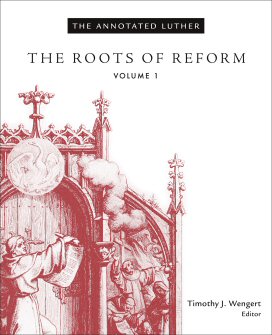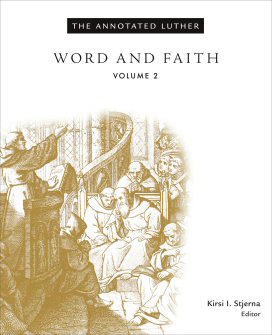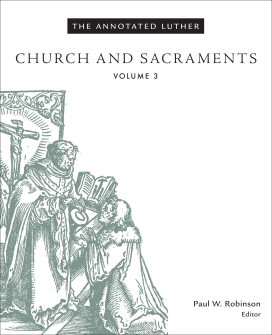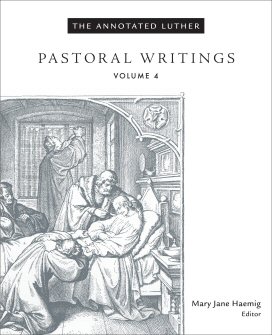The Annotated Luther Series (6 vols.)
Digital Logos Edition
Overview
In preparation for the 500th anniversary of Martin Luther’s posting of the 95 Theses in 1517—with which he ignited the Reformation—Fortress Press has assembled The Annotated Luther series. It features 75 of Luther’s most essential writings with refreshed translations in six volumes, including The Heidelberg Disputation, Freedom of the Christian, and many more. Top Luther scholars provide commentary on each work, noting historical context, theological background, and textual issues. Elegant and lucid illustrations, timelines, artwork, images, and photos enrich each volume. The series features the collaborative work of more than 40 scholars led by Hans Hillerbrand, Kirsi Stjerna, and Timothy Wengert.
The Annotated Luther series facilitates easy access to Luther and is an excellent resource for anyone who studies the storied reformer. Whether you are a seasoned expert or just beginning to learn about Luther’s ideas, this series brings Luther’s ideas to life in fresh new ways.

- Provides annotations and key background information for people, events, and theological issues during the Reformation
- Identifies Scripture references to which Luther alludes, but does not include, in his text
- Includes commentary from top Luther scholars
- Clarifies the historical setting with maps, illustrations, timelines, artwork, images, and photos
“This Annotated Luther series will facilitate easy access to Luther, especially for those who could not do so in the German or Latin. This will be a great resource likely to be translated into many vernacular languages.”
—Kenneth Mtata, The Lutheran World Federation
“The Annotated Luther series represents a finely crafted synthesis between readable primary texts and some of the best secondary scholarship. A superb editorial team, under the leadership of Hillerbrand, Stjerna, and Wengert, has made 75 selections, ranging from major treatises to sermons and letters, and beautifully laid these out in six volumes, together with state-of-the-art analyses and explanatory notes. Luther the theologian, the biblical interpreter, the pastor, the social/political thinker—all are given their due, and the resulting multidimensional portrait combines balance with a newly sharpened focus. In sum, a signal achievement.”
—Denis R. Janz, Loyola University New Orleans
“The Annotated Luther series provides a very welcome resource for meeting Luther again in the contemporary world. With language refreshed for our time, we can see more clearly Luther as a man who is actively grappling with a society undergoing dramatic challenges economically, religiously, and socially. By providing skilled commentary from scholars around the world and from diverse theological perspectives, this work will be of great help for modern Christians seeking to adapt and extend the insights from the Reformation to modern challenges.”
—Maria E. Erling, Lutheran Theological Seminary at Gettysburg
- Title: The Annotated Luther
- Series: The Annotated Luther
- Publisher: Fortress Press
- Volumes: 6
- Pages: 3,014
- Christian Group: Lutheran
- Resource Type: Collected Works
- Topic: Lutheran Theology
Individual Titles
- The Annotated Luther, Volume 1: The Roots of Reform edited by Timothy J. Wengert
- The Annotated Luther, Volume 2: Word and Faith edited by Kirsi I. Stjerna
- The Annotated Luther, Volume 3: Church and Sacraments edited by Paul W. Robinson
- The Annotated Luther, Volume 4: Pastoral Writings edited by Mary Jane Haemig
- The Annotated Luther, Volume 5: Christian Life in the World edited by Hans J. Hillerbrand
- The Annotated Luther, Volume 6: The Interpretation of Scripture edited by Euan K. Cameron
This title is included in the following collections
You can save when you purchase this product as part of a collection.
Logos 8 Lutheran Starter Legac...
$39.99$39.99Logos 9 Lutheran Starter Legac...
$39.99$39.99Logos 8 Lutheran Bronze Legacy...
$89.99$89.99Logos 9 Lutheran Bronze Legacy...
$89.99$89.99
- $349.99$244.99
- $349.99
- $349.99
- $849.99$594.99
- $849.99
- $849.99
- $1,499.99$1,049.99
- $1,499.99$1,049.99
- $1,999.99$1,399.99
- $1,499.99
- $1,499.99
- $2,999.99$2,099.99
- $2,999.99$2,099.99
- $3,499.99$2,449.99
- $2,999.99
- $2,999.99
- $2,999.99
- $4,749.99$3,324.99
- $4,749.99$3,324.99
- $4,749.99
- $4,749.99
- $4,749.99
- $23,999.99$16,799.99
- $21,749.99
- $24,999.99

Volume 1 of The Annotated Luther series contains writings that defined the roots of reform set in motion by Martin Luther, beginning with the Ninety-Five Theses (1517) through The Freedom of a Christian (1520). Included are treatises, letters, and sermons written from 1517 to 1520, which set the framework for key themes in all of Luther’s later works. Also included are documents that reveal Luther’s earliest confrontations with Rome and his defense of views and perspectives that led to his excommunication by Leo X in 1520.
Contents:
- The Ninety-Five Theses [or] Disputation for Clarifying the Power of Indulgences
- Letter from Martin Luther to Albrecht, Archbishop of Mainz, Dated 31 October 1517
- A Sermon on Indulgences and Grace by the Worthy Doctor Martin Luther, Augustinian Friar in Wittenberg
- Heidelberg Disputation
- The Proceedings at Augsburg (1518)
- A Sermon on the Meditation of Christ’s Holy Passion
- Sermon on the Sacrament of Penance, 1519
- The Holy and Blessed Sacrament of Baptism
- The Blessed Sacrament of the Holy and True Body of Christ, and the Brotherhoods
- Treatise on Good Works
- To the Christian Nobility of the German Nation concerning the Improvement of the Christian Estate, 1520
- The Freedom of a Christian
These documents display a Luther grounded in late medieval theology and its peculiar issues, trained in the latest humanist methods of the Renaissance, and, most especially, showing sensitivity toward the pastoral consequences of theological positions and church practice.
The advent of The Annotated Luther series should be cause for celebration among scholars, pastors, students, and others eager to have easy access to so many of Martin Luther’s key writings. If the appealing layout, rich images, and erudite editorials featured in volume 1 are an indication of what’s to come, then The Annotated Luther will quickly become the go-to resource for learning about Luther’s work and context.
—Hans Wiersma, Augsburg College
Wengert and his colleagues have produced a valuable text for classroom use and personal study. This is an excellent start to what promises to be a fine series.
—Kathryn A. Kleinhans, Wartburg College
As congregations and members of congregations face an increasingly more diverse and chaotic world, their struggle for what it means to be Christian in their context increases, not unlike Christians in Luther’s day. I am thrilled that Fortress Press is publishing The Annotated Luther, Volume I: The Roots of Reform. The individual works included in this volume are central to the particular witness Lutherans can share for a life of faith in the world and how it can be a witness of hope in the midst of pluralism and change. The essays and study tools, included alongside the original texts, bring these works to life for us today. I encourage you to include this series in your congregation’s library and use it for group or personal study.
—Gordon J. Straw, program director for Lay Schools for Ministry, Congregational and Synodical Mission Unit, ELCA
Timothy J. Wengert is Ministerium of Pennsylvania Professor of Reformation History at the Lutheran Theological Seminary in Philadelphia. He is a representative for ELCA on the Commission on Faith and Order of the National Council of Churches. He is author or editor of several books including Reading the Bible with Martin Luther: An Introductory Guide and Law and Gospel: Philip Melancthon’s Debate with John Agricola of Eisleben over Poenitentia and co-editor with Robert Kolb of The Book of Concord.

Volume 2 of The Annotated Luther series contains a number of the writings categorized under the theme: word and faith. Luther was particularly focused on what the word “does” in order to create and sustain faith. Writings in the volume range from the large works such as Bondage of the Will, Against the Heavenly Prophets, The Smalcald Articles, and the Large Catechism to Luther’s own Confession of Faith and treatments of Moses, the Gospels, and Two Kinds of Righteousness.
Contents:
- Sermon on Two Kinds of Righteousness
- What to Look for in the Gospels
- Against the Heavenly Prophets in the Matter of Images and Sacraments
- How Christians Should Regard Moses
- Bondage of the Will
- Confession of Faith (from Confession of the Articles of Faith against the Enemy of the Gospel and All Kinds of Heresies)
- The Large Catechism
- The Smalcald Articles
In the treatises in this volume, we hear Luther’s understanding of Scripture and theology as he continues his growth as teaching theologian, pastor, biblical exegete, and apologist for the faith.
Professor Stjerna and her team of world-leading Reformation scholars have done us all a great service in fixing their eyes for detail and context onto these important writings of Luther. Those new to the Reformation saga and even those familiar with its events and debates will learn very much from these pages. By keeping readers honest to context when approaching Luther’s theology, they invite church and academy to remain honest about their own missions, failings, and need for reform. A splendid, and eminently useful, achievement.
—Derek R. Nelson, Wabash College
“This outstanding presentation of the core of Luther’s theology offers eight of his seminal works written over two decades, including those regarded by author as worthy of preserving for posterity. Magisterial introductions by internationally renowned theologians, editorial comments, artworks, prints, and proficient annotations bring forth the distinctiveness of the theology of the Wittenberg Reformer. Careful commentary of the translations adds to the uniqueness of the volume while all-embracing language highlights propriety. With this work, Luther studies have been aided with a consummate edition of the intellectual production of a supreme theological mind.”
—Vitor Westhelle, Lutheran School of Theology at Chicago
“Luther’s writings as contained in this fine collection are as helpful to read today as when he first wrote them to such a profound historical effect. They continue to be fertile for further theological reflection and biblical insight. Introductions and many marginal notes also explain items for better understanding–including those which criticize Luther, making this volume useful for instruction in church and classroom settings.”
—Peter Krey, pastor, Christ Lutheran Church, El Cerrito, California
Kirsi I. Stjerna is Synod Professor of Lutheran History and Theology at Pacific Lutheran Theological Seminary of California and docent at the University of Helsinki. She is author or editor of several books including Women and the Reformation and co-editor with Brooks Schramm Martin Luther, the Bible, and the Jewish People.

Volume 3 of The Annotated Luther series features Luther's focus on the church and his understanding of the meaning of the sacraments. This volume focuses on Luther's teaching concerning proper understanding and reception of the sacraments, his insights regarding worship, and his understanding of the church.
Contents:
- The Babylonian Captivity of the Church
- The German Mass and Order of the Liturgy
- That These Words of Christ
- Concerning Rebaptism
- On the Councils and the Church
Luther refused to tolerate a church built on human works, whether it was the pope's authority or the faith or decision of individual believers. This is the thread that runs through all the texts in this volume: the church and sacraments belong to Christ, who founded and instituted them.
The Annotated Luther series represents a finely crafted synthesis between readable primary texts and some of the best secondary scholarship. A superb editorial team, under the leadership of Hillerbrand, Stjerna, and Wengert, has made seventy-five selections, ranging from major treatises to sermons and letters, and beautifully laid these out in six volumes, together with state-of-the-art analyses and explanatory notes. Luther the theologian, the biblical interpreter, the pastor, the social/political thinker—all are given their due, and the resulting multidimensional portrait combines balance with a newly sharpened focus. In sum, a signal achievement.
—Denis R. Janz, professor, Loyola University New Orleans
Paul W. Robinson is professor of historical theology and chair of the Department of Historical Theology at Concordia Seminary, St. Louis.

Volume 4 of The Annotated Luther series features Luther's writings on prayer and his more personal insights on human suffering, the Christian life, and death. Faith prepares and gives hope to the followers of Christ who face adversity. This will be heard in selected letters, sermons, hymns, and his popular Small Catechism.
Contents:
- Various Hymns and Sermons including the Invocavit Sermons
- Small Catechism
- Personal Prayer Book
- A Simple Way to Pray
- The Magnificat
- Sermon on Preparing to Die
- Whether One May Flee from a Deadly Plague
- Comfort for Women Who Have Had a Miscarriage
In the introduction, the editor Timothy Wengert again shows why he is one of the premier Reformation scholars of our generation when it comes to communicating the historical significance and pastoral value of Luther's writings. Both he and the other editors of Luther's writings do an outstanding job of providing helpful introductions (beyond a paragraph or two that barely scratches the surface), explanatory annotations, and maps. The layout of the volume deserves special mention for the way that it draws the reader into the text. In brief, this volume will be indispensable to anyone who wishes to understand better the early writings of the reformer, Martin Luther!
—Charles P. Arand, professor, Concordia Seminary, St. Louis
Mary Jane Haemig is professor of church history at Luther Seminary, St Paul.

Volume 5 of The Annotated Luther series features Luther’s writings that intersect church and state, faith, and life lived as a follower of Christ. His insights regarding marriage, trade, public education, and war are articulated. His theological and biblical insights also colored the way he spoke of the Jews and Turks, as well his admonition to the German peasants in their uprisings against the established powers.
Contents:
- Introduction
- Luther’s Will
- A Sermon on the Estate of Marriage Revised and Corrected by Dr. Martin Luther
- On the Estate of Marriage
- On Secular Authority: To What Extent It Should Be Obeyed
- On Business and Usury
- Whether Soldiers, Too, Can be Saved
- To the Councilmen of All Cities in Germany That They Establish and Maintain Christian Schools
- Admonition to Peace, A Reply to the Twelve Articles of the Peasants in Swabia
- On War Against the Turk
- That Jesus Christ Was Born a Jew
- About the Jews and Their Lies
- On the Schem Hamphoras and On the Lineage of Christ
Luther believed that the Christian life could and should be lived out fully within the world. He taught that rulers, pastors, husbands and wives, business people and craftsmen all served God by fulfilling their responsibilities within their vocations. The Annotated Luther Volume 5 provides contemporary translations of Luther’s treatises on marriage, schools, business and moneylending, soldiers and warfare, and politics as well as his views on the Jews and Turks. Luther’s attempts to relate the Gospel to human activity in all spheres of life all repay careful study, even where they appear dated or wrong. The scholars who translated, introduced and annotated them have done their readers a great service.
—Stephen Burnett, University of Nebraska-Lincoln
Judiciously selected and expertly introduced by leading scholars, the works in this volume reveal Luther’s views on a wide range of themes pertaining to Christian life in the world—from marriage to war to interactions with Turks and Jews. The writings presented here rank among Luther’s most important and profound works—as well as, sometimes, his most disturbing. With helpful introductions that illuminate the contexts in which Luther wrote, no other single volume offers a better starting point for students, pastors, and all readers interested in how Luther confronted the ever-present question, ‘How is the Christian to live in society?’
—Vincent Evener, Lutheran Theological Seminary at Gettysburg
This volume of the Annotated Luther explores the work of Martin Luther as he engaged with the pressing issues of his day. The writings in this volume, carefully edited and contextualized with introductions and supporting materials by the editors, present Luther’s thoughts on a range of topics, from the mundane to the controversial, from marriage and trade to the Peasants’ War and the Jews.
—Greta Kroeker, University of Waterloo
Hans J. Hillerbrand is professor emeritus, Duke University Department of Religion. He has served as president of the Society for Reformation Research and the American Society of Church History. His many publications include volumes on Christian history, Protestantism, and the Reformation.

This volume features Martin Luther the exegete and Bible teacher. His vast exegetical writings and lectures on Scripture are introduced through important examples from both the Old and New Testaments. Included in the volume is his brief treatise “On Translating” and his prefaces to both the Old and New Testaments, to key sections of Scripture (Psalter, Prophets), and to select books such as Genesis, Isaiah, Daniel, Romans, and Galatians. The content is rounded out by examples from his lectures and sermons on specific texts, including such examples as Genesis 1:26–2:3; Psalms 51 and 118; Isaiah 53; John 1:14; Romans 3:20–27; and 1 Corinthians 15:16–23.
Contents:
- Introduction
- On Translating
- Preface to the Old Testament
- Intro to Genesis 1–2
- Genesis 1:26—2:3
- Genesis 2L21-25
- Genesis 3:2-16
- Preface to Psalter
- Psalm 51
- Psalm 72
- Psalm 118
- Preface to Prophets
- Preface to Isaiah
- Isaiah 53
- Preface to Daniel
- Preface to NT
- Matthew 7:12
- John 1:14
- Preface to Romans
- Romans 3:20-27
- 1 Cor. 15:16-23, 51-57
- Preface to Galatians
- Galatians 2:15-16
Euan K. Cameron is Henry Luce III Professor of Reformation Church History at Union Theological Seminary, New York. His current research explores how biblical and theological concerns informed and shaped historical thought in the later Middle Ages and the Reformation era. Cameron is a prolific author and editor of several volumes, including The New Cambridge History of the Bible.
Martin Luther (1483–1546), one of the most significant figures in Western history, was the key figure in the Protestant Reformation. Over the course of his life, Luther was a monk, a priest, a professor of biblical literature, a Reformer, a husband, and a father.
Luther is most noted for his Ninety-Five Theses (1517), in which he argued that indulgences were not acts of penance which could replace true repentance. His refusal to retract all his writings, demanded by Pope Leo X in 1520 and the Holy Roman Emperor Charles V at the Diet of Worms in 1521, resulted in his excommunication by the pope and condemnation as an outlaw by the emperor.
Luther has been both praised and vilified for what he preached and wrote. Luther’s translation of the Christian Bible into the vernacular greatly influenced the church. His works continue to impact all Christians and animate the movement that bears his name.
Reviews
2 ratings
Aaron Sauer
12/27/2023

Daniel Caballero
10/12/2017
An awesome collection. I have read the first two volumes in the print edition. Great resource on Luther and Reformation Studies.